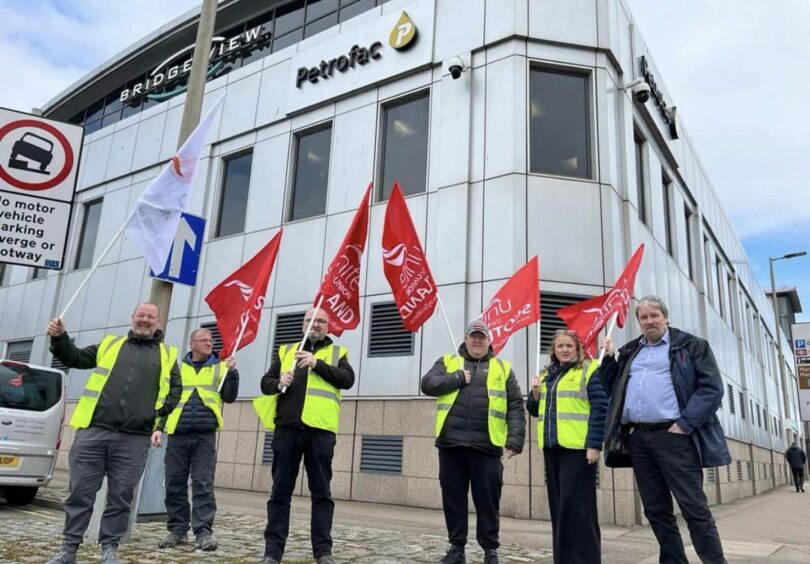“There are more and more comparisons to be drawn” between the large-scale miner’s strikes of the 1980s and the effects of Labour’s windfall tax hike, unions say.
This week Aberdeen and Grampian Chamber of Commerce (AGCC) policy director Ryan Crighton compared the impact of Labour’s plans for the North Sea to that of the miner’s strikes in 1984-85 which were prompted by the loss of some 20,00 jobs.
Recent analysis has shown that in a “worst case scenario” up to 100,00 jobs could be at risk, were all drilling to stop.
The Labour Party last week vowed to up the existing Energy Profits Levy (EPL), bringing headline tax rates for UK oil and gas operators to 78%. Ostensibly this would bring rates in line with that of Norway, but with investment incentives also set to be withdrawn, sector leaders say the two fiscal regimes would not be comparable.
Union officials have since hit out at the “madness” of the proposals.
Unite regional officer John Boland told Press & Journal sister website Energy Voice: “There are more and more comparisons be drawn to the destruction of the UK mining industry, and we cannot let this happen for the UK oil and gas industry.
“Unite will do whatever is needed to protect its members’ jobs now and in the future.”
A member of Scotland’s Just Transition Commission and former regional organiser for trade union RMT, Jake Molloy, said the industry “cannot rule out” the potential for strike action by workers, like that taken by UK mining community in the 1980s.
“We shouldn’t be using the blunt instrument of taxation to address the process of transition,” Mr Molloy added.
“The blunt instrument of tax can only succeed if there is an operation to tax. The concept is therefore a conflicting approach, shortsighted and ill-conceived.”
He said if the UK wants to change taxation it should be changed “in a way that drives the whole green economy drives the transition and makes it just for all parties, because we simply cannot continue with this madness.”
Union shares concerns on ‘major job losses’
Investment bank Stifel has outlined that the Labour tax hike puts between 20,000 and 100,000 jobs at risk. At the same time, trade body Offshore Energies UK (OEUK) explained that £26 billion of economic value would be lost after Labour unveiled manifesto plans.
Stifel managing director for oil and gas Chris Wheaton said that 2024 could be “the last year of major spending in the UK North Sea because of concerns over where the tax structure might be 2025-onwards.”
The UK’s largest producer of oil and gas, Harbour Energy has already slashed funding in local projects after it shared disapproval over the already controversial windfall tax that brought rates to 75%, of which 35% comes under the EPL.
Mr Boland said that “the implications of this are being discussed at senior levels within Unite,” adding that the union’s concern lies with the workers and the communities they live in.
“We are concerned that some of the current Labour policies could lead to a reduction in investment, early decommissioning, and major job losses,” he added.
Avoiding industrial action ‘at all costs’
Tensions are already high among offshore workers as last year Unite the Union coordinated a series of strike action that saw 1,300 people down tools.
Unions described the events of April 2023 as a “tsunami” of industrial unrest as an “army” of workers cabined up.
The striking oil workers were seeking an increase in wages and an improvement in their working conditions as the union claimed platforms ceased production.
A striking Unite member told Energy Voice at the time: “I’ve been offshore for 10 years and I was getting paid more then.
“The way we’re being treated is going downhill, since 2015 we’ve been told ‘you’re lucky to have a job.”
With wide-ranging industrial unrest having recently taken place and comparisons between Labour’s policy and the events of the 1980s within the mining community.
Mr Molloy said: “We should be trying to avoid, at all costs, the threat of industrial action and the potential of pulling workers out in dispute in the sector.
“Instead we should be looking at alternative employment as part of the transition and training these people to transition across the sector.”
‘Currently there is no Just Transition available’
The union regional officer said that the goal is to keep workers in offshore oil and gas jobs “for as long as possible” or until “comparable” clean energy jobs are available for them to move to.
Late last year the Just Transition Commission claimed that Scotland is not on track to deliver, and that “significant” further action is needed to support the workforce.
The commission reported that “transformative leadership is now required” and that a just transition hinges on a “genuine whole-of-government approach.”
Mr Boland argued: “Currently there is no Just Transition available for them, and governments and prospective governments need to realise this.”
Mr Molloy added: “There’s much, much more we could be doing in terms of avoiding any potential for industrial action and instead taking those workers along with us and through a transition, otherwise, the idea of this ‘just transition’ is lost.”
If workers begin to strike as a result of the closure of North Sea assets, he continued: “We have failed as a country and the government has failed the nation, the industry and the workforce.”
This week OEUK asked for a ‘holistic’ approach to energy policy and tax incentives in the upcoming Spring Budget = something Mr Molloy also supports.
Citing the estimated costs of transition at around £1.4 trillion, OEUK argued for a “homegrown energy transition” which it says would protect jobs and boost sustainability.
To achieve this the trade body recommended an independent statutory body with the powers and resources to oversee the delivery of UK energy objectives and net zero commitments.
The aim of this organisation, which would take up a Bank of England-like role, would be to “depoliticise the decision-making” around the UK’s energy transition.




